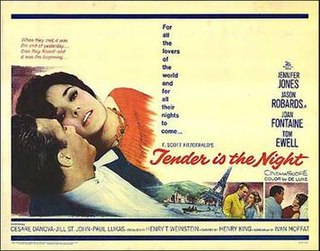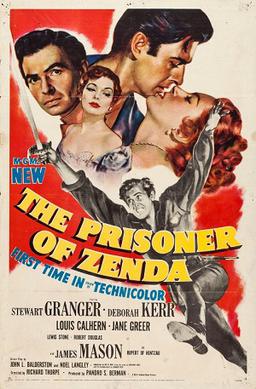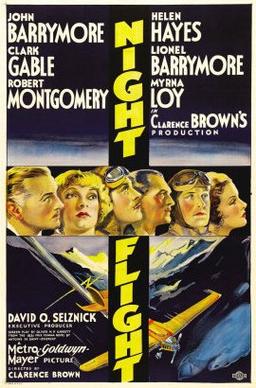
William Clark Gable was an American film actor. Often referred to as the "King of Hollywood", he had roles in more than 60 films in a variety of genres during a career that lasted 37 years, three decades of which was as a leading man. He was named the seventh greatest male movie star of classic American cinema by the American Film Institute.

Carole Lombard was an American actress. In 1999, the American Film Institute ranked Lombard 23rd on its list of the greatest female stars of Classic Hollywood Cinema.

To Be or Not to Be is a 1942 American black comedy film, directed by Ernst Lubitsch, starring Carole Lombard and Jack Benny, and featuring Robert Stack, Felix Bressart, Lionel Atwill, Stanley Ridges and Sig Ruman. The plot concerns a troupe of actors in Nazi-occupied Warsaw who use their abilities at disguise and acting to fool the occupying troops. It was adapted by Lubitsch (uncredited) and Edwin Justus Mayer from the story by Melchior Lengyel. The film was released one month after actress Carole Lombard was killed in an airplane crash. In 1996, it was selected for preservation in the United States National Film Registry by the Library of Congress as being "culturally, historically, or aesthetically significant."

The Paradine Case is a 1947 courtroom drama with elements of film noir set in England, directed by Alfred Hitchcock and produced by David O. Selznick. Selznick and an uncredited Ben Hecht wrote the screenplay from an adaptation by Alma Reville and James Bridie of the 1933 novel by Robert Smythe Hichens. The film stars Gregory Peck, Ann Todd, Alida Valli, Charles Laughton, Charles Coburn, Ethel Barrymore, and Louis Jourdan. It tells of an English barrister who falls in love with a woman who is accused of murder, and how it affects his relationship with his wife.

Mr. & Mrs. Smith is a 1941 American screwball comedy film directed by Alfred Hitchcock, written by Norman Krasna, and starring Carole Lombard and Robert Montgomery. It also features Gene Raymond, Jack Carson, Philip Merivale, and Lucile Watson.

Nothing Sacred is a 1937 American Technicolor screwball comedy film directed by William A. Wellman, produced by David O. Selznick, and starring Carole Lombard and Fredric March with a supporting cast featuring Charles Winninger and Walter Connolly. Ben Hecht was credited with the screenplay based on the 1937 story "Letter to the Editor" by James H. Street, and an array of additional writers, including Ring Lardner Jr., Budd Schulberg, Dorothy Parker, Sidney Howard, Moss Hart, George S. Kaufman and Robert Carson made uncredited contributions.
John Cromwell was an American film and stage director and actor. His films spanned the early days of sound to film noir in the early 1950s, by which time his directing career was almost terminated by the Hollywood blacklist.

John Elmer Carson, known as Jack Carson, was a Canadian-born American film actor. Carson often played the role of comedic friend in films of the 1940s and 1950s, including The Strawberry Blonde (1941) with James Cagney and Arsenic and Old Lace (1944) with Cary Grant. He appeared in such dramas as Mildred Pierce (1945), A Star is Born (1954), and Cat on a Hot Tin Roof (1958). He worked for RKO and MGM, but most of his notable work was for Warner Bros.

Jane Eyre is a 1943 American film adaptation of Charlotte Brontë's 1847 novel of the same name, released by 20th Century Fox. It was directed by Robert Stevenson and produced by the uncredited Kenneth Macgowan and Orson Welles; Welles also stars in the film as Edward Rochester, with Joan Fontaine playing the title character.

Tender Is the Night is a 1962 American film directed by Henry King and starring Jennifer Jones and Jason Robards, Jr. King's last film, it is based on the 1934 novel of the same name by F. Scott Fitzgerald.

Hands Across the Table is a 1935 American romantic screwball comedy film directed by Mitchell Leisen and released by Paramount Pictures. It stars Carole Lombard as a manicurist looking for a rich husband and Fred MacMurray as a poor playboy, with Ralph Bellamy as a wealthy ex-pilot in a wheelchair. The teaming of Lombard and MacMurray was so well received, they went on to make three more films together, The Princess Comes Across (1936), Swing High, Swing Low (1937), and True Confession (1937).

In Name Only is a 1939 romantic film starring Cary Grant, Carole Lombard, and Kay Francis, directed by John Cromwell. It was based on the 1935 novel Memory of Love by Bessie Breuer. The fictional town where it is set, Bridgefield, Connecticut, is based on the town of Ridgefield, Connecticut.

Wide Sargasso Sea is a 1993 Australian film directed by John Duigan, and starring Karina Lombard and Nathaniel Parker. It is an adaptation of Jean Rhys's 1966 novel of the same name.

The Prisoner of Zenda is a 1952 American Technicolor adventure film version of the 1894 novel of the same name by Anthony Hope and a remake of the 1937 sound version and the 1922 silent. This first color version, made by Loew's and Metro-Goldwyn-Mayer, was directed by Richard Thorpe and produced by Pandro S. Berman. The film stars Stewart Granger, Deborah Kerr, and James Mason, with Louis Calhern, Robert Douglas, Jane Greer, and Robert Coote in supporting roles.

Beauty for Sale is a 1933 American pre-Code film about the romantic entanglements of three beauty salon employees. Based on the 1933 novel Beauty by Faith Baldwin, it stars Madge Evans, Alice Brady, Otto Kruger and Una Merkel.

The Women is a 1939 American comedy-drama film directed by George Cukor. The film is based on Clare Boothe Luce's 1936 play of the same name, and was adapted for the screen by Anita Loos and Jane Murfin, who had to make the film acceptable for the Production Code for it to be released.

The Scarlett O'Hara War is a 1980 American made-for-television drama film directed by John Erman. It is based on the 1979 novel Moviola by Garson Kanin. Set in late 1930s Hollywood, it is about the search for the actress to play Scarlett O'Hara in the much anticipated film adaptation of Gone with the Wind (1939). This film premiered as the finale of a three-night TV miniseries on NBC called Moviola: A Hollywood Saga.

The Lost Squadron is a 1932 American pre-Code drama, action, film starring Richard Dix, Mary Astor, and Robert Armstrong, with Erich von Stroheim and Joel McCrea in supporting roles, and released by RKO Radio Pictures. Based on the novel The Lost Squadron (1932) by Dick Grace, the film is about three World War I pilots who find jobs after the war as Hollywood stunt fliers.

Night Flight is a 1933 American pre-Code aviation drama film produced by David O. Selznick, distributed by Metro-Goldwyn-Mayer, directed by Clarence Brown and starring John Barrymore, Lionel Barrymore, Clark Gable, Helen Hayes, Robert Montgomery and Myrna Loy.

Dick Turpin is a 1925 American silent historical adventure film directed by John G. Blystone produced and distributed by Fox Film Corporation and starring western hero Tom Mix. Mix departs from his usual western roles to play a British historical figure, the highwayman Dick Turpin (1705-1739). A young Carole Lombard was filmed in several scenes which mostly ended up on the cutting room floor.



















